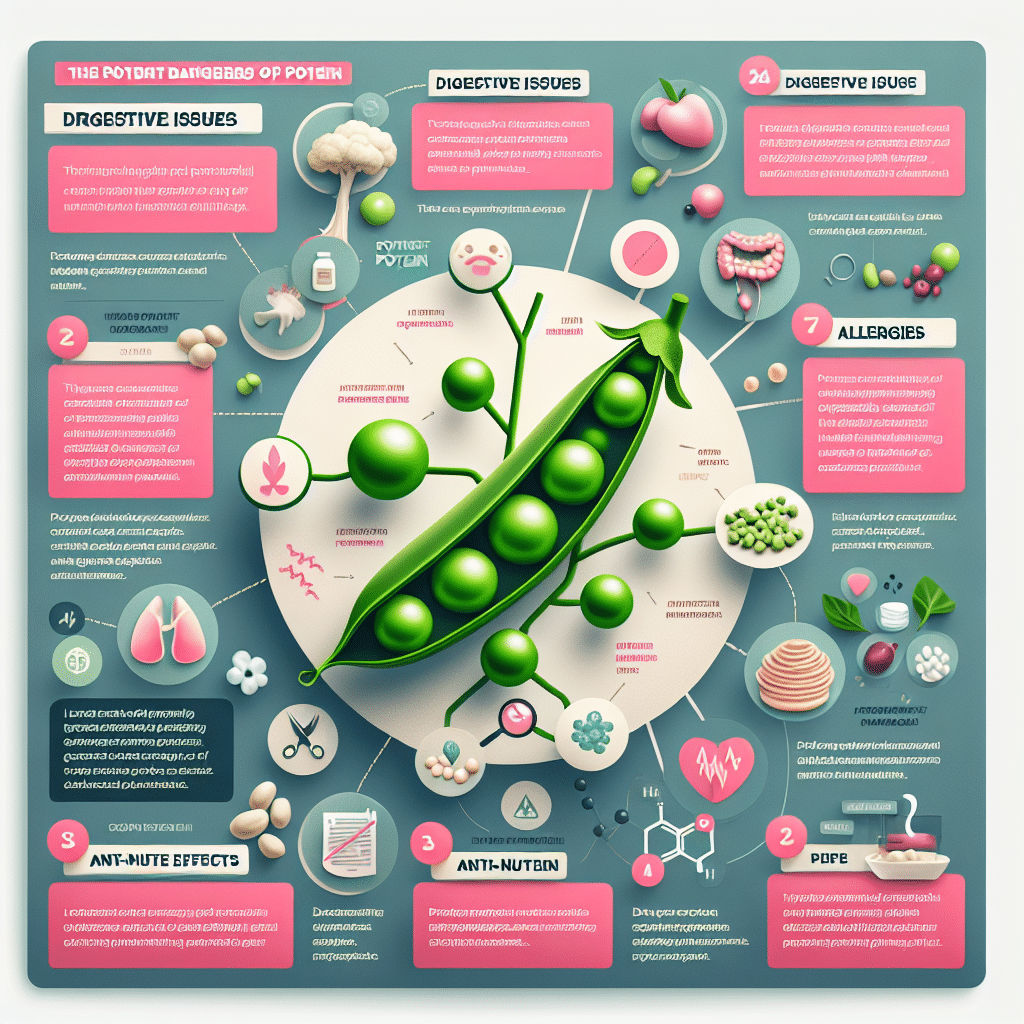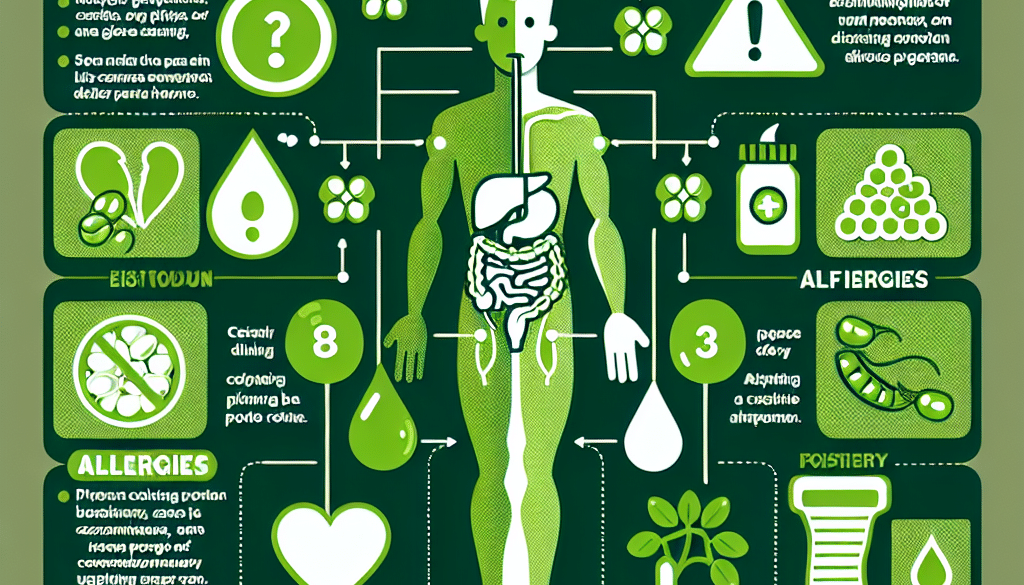Pea Protein Risks: What to Watch Out For
Table of Contents
- Pea Protein Dangers: Key Concerns and Safety Tips
- Understanding Pea Protein
- Potential Allergic Reactions
- Anti-Nutritional Factors
- Heavy Metal Contamination
- Gastrointestinal Discomfort
- Interactions with Medications
- Nutritional Imbalance
- Environmental and Ethical Considerations
- Conclusion: Balancing Benefits and Risks
- Discover ETprotein’s High-Quality Protein Products
Pea Protein Dangers: Key Concerns and Safety Tips

Pea protein has emerged as a popular plant-based alternative to animal-derived proteins, especially among vegans, vegetarians, and those with lactose intolerance. Its rise in popularity is due to its high protein content, hypoallergenic nature, and sustainability. However, as with any food product, there are potential risks and side effects that consumers should be aware of. This article delves into the possible dangers associated with pea protein and provides guidance on what to watch out for.
Understanding Pea Protein
Before we explore the potential dangers, it’s important to understand what pea protein is and why it’s become a favored choice in the health and wellness community. Pea protein is derived from yellow split peas and is processed to remove the majority of carbohydrates and fats, leaving a concentrated protein powder. It’s often used in protein shakes, bars, and as a food additive to increase protein content.
Potential Allergic Reactions
Although pea protein is considered hypoallergenic, some individuals may experience allergic reactions. Symptoms can range from mild to severe and include:
- Skin reactions such as hives or rashes
- Respiratory issues like wheezing or difficulty breathing
- Gastrointestinal discomfort, including nausea, bloating, or diarrhea
- Anaphylaxis, a potentially life-threatening reaction
It’s crucial for individuals with known legume allergies to consult with a healthcare provider before incorporating pea protein into their diet.
Anti-Nutritional Factors
Pea protein, like other plant proteins, contains anti-nutritional factors that can interfere with the absorption of nutrients and lead to digestive issues. These include:
- Lectins, which can cause gastrointestinal distress
- Phytates, which can reduce the absorption of minerals like iron and zinc
- Oxalates, which can contribute to kidney stone formation in susceptible individuals
Proper processing and preparation can minimize the impact of these anti-nutritional factors.
Heavy Metal Contamination
One of the concerns with plant-based proteins, including pea protein, is the potential for heavy metal contamination. Plants can absorb heavy metals from the soil, which may then be concentrated in protein powders. Consuming products with high levels of heavy metals over time can lead to health issues such as:
- Neurological problems
- Reduced immune function
- Increased risk of cancer
Choosing pea protein products that have been tested for heavy metals and selecting reputable brands can help mitigate this risk.
Gastrointestinal Discomfort
Some individuals may experience gastrointestinal discomfort when consuming pea protein. This can be due to the fiber content, which can cause bloating and gas, or due to the protein itself, which can be difficult for some to digest. Introducing pea protein gradually and staying hydrated can help alleviate these symptoms.
Interactions with Medications
Pea protein can interact with certain medications, affecting their absorption and efficacy. For example, it can bind to some medications, reducing their bioavailability. It’s important to discuss with a healthcare provider if pea protein should be consumed in conjunction with specific medications.
Nutritional Imbalance
While pea protein is rich in protein, it is not a complete source of all essential amino acids. Relying solely on pea protein for protein intake can lead to an imbalance in amino acids, which are crucial for various bodily functions. Including a variety of protein sources in the diet can ensure a balanced amino acid profile.
Environmental and Ethical Considerations
Although pea protein is often touted for its sustainability, it’s important to consider the environmental and ethical implications of its production. The sourcing of peas, the manufacturing process, and the carbon footprint of production and distribution all play a role in the overall impact of pea protein on the environment.
Conclusion: Balancing Benefits and Risks
Pea protein offers many benefits as a plant-based protein source, but it’s important to be aware of the potential dangers and take steps to minimize risks. By choosing high-quality products, introducing pea protein gradually, and maintaining a varied diet, consumers can enjoy the advantages of pea protein while mitigating the downsides.
Discover ETprotein’s High-Quality Protein Products
If you’re looking for a reliable source of plant-based proteins, ETprotein offers a range of products that meet the highest standards of quality and safety. Their organic pea protein is carefully processed to reduce anti-nutritional factors and tested for heavy metals, ensuring that you receive a pure and safe product. With ETprotein, you can confidently incorporate pea protein into your diet without compromising on health or taste.
About ETprotein:
ETprotein, a reputable protein Chinese factory manufacturer and supplier, is renowned for producing, stocking, exporting, and delivering the highest quality organic bulk vegan protein and plant proteins. They include Organic rice protein, clear rice protein, pea protein, clear pea protein, pumpkin seed protein, sunflower seed protein, mung bean protein, etc. Their offerings, characterized by a neutral taste, non-GMO, allergen-free attributes, cater to a diverse range of industries. They serve nutraceutical, pharmaceutical, cosmeceutical, veterinary, as well as food and beverage finished product distributors, traders, and manufacturers across Europe, USA, Canada, Australia, Thailand, Japan, Korea, Brazil, and Chile, among others.
ETprotein specialization includes exporting and delivering tailor-made protein powder and finished nutritional supplements. Their extensive product range covers sectors like Food and Beverage, Sports Nutrition, Weight Management, Dietary Supplements, Health and Wellness Products, and Infant Formula, ensuring comprehensive solutions to meet all your protein needs.
As a trusted company by leading global food and beverage brands and Fortune 500 companies, ETprotein reinforces China’s reputation in the global arena. For more information or to sample their products, please contact them and email sales(at)ETprotein.com today.












